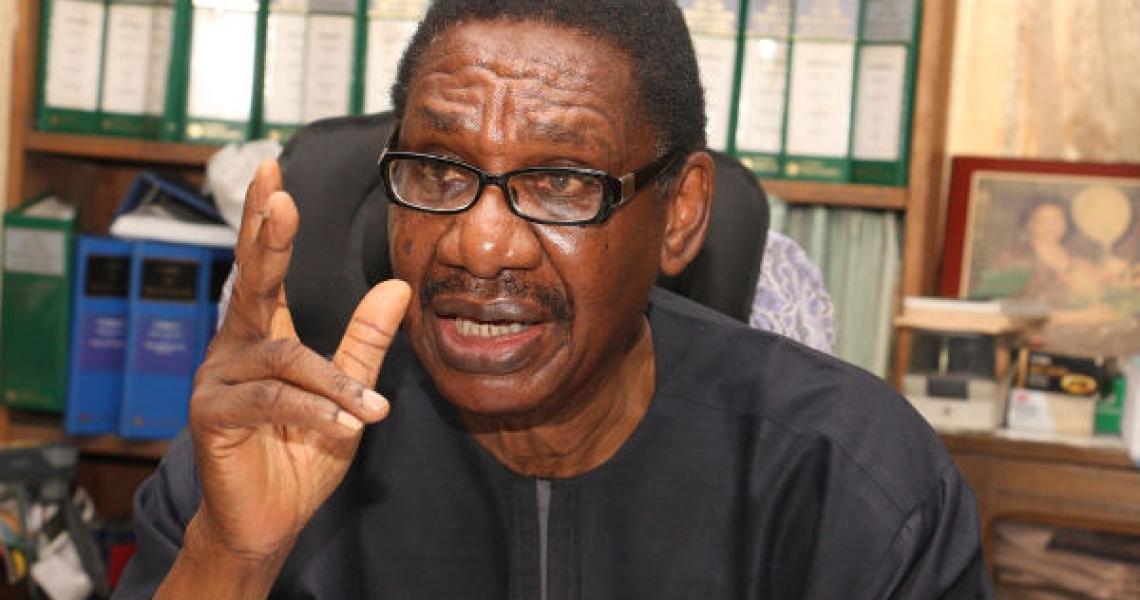This material belongs to: The Nation.
The Presidential Advisory Committee Against Corruption (PACAC) will push for the prosecution of bank chiefs who connive with looters to hide stolen funds, its chairman, Prof Itse Sagay (SAN), said yesterday.
According to him, the “monstrous epidemic of high profile corruption” could not have afflicted Nigeria without bankers’ collusion.
They must not get away with it, Sagay said.
“In my own little way, we are going to push for the prosecution of such bank chiefs. They must be prosecuted,” he said.
Sagay said the legislature, senior lawyers, especially Senior Advocates of Nigeria (SANs), and some “hostile and powerful judges” work against efforts to rid the country of corruption.
“There is a gang-up of the of the powerful political, business and banking elite that is determined to frustrate the anti-corruption struggle,” he said.
The PACAC chairman delivered a public lecture in Lagos on the topic: The many afflictions of anti-corruption crusade in Nigeria. It was organised by the Nigerian Society of International Law.
Sagay said the National Assembly was made up of self-serving lawmakers who allocated N125 billion to themselves alone this year.
He said while the United States President earns $400,000 per annum, a Nigerian senator earns over $1.7million.
Sagay said apart from a basic salary of N2.4 million per month, they earned allowances, such as hardship (50 per cent of basic salary), newspaper allowance (50 per cent), wardrobe allowance (25 per cent), entertainment (30 per cent), recess (10 per cent) and leave (10 per cent), among others.
The total allowances, he said, amounts to N29.5million per month and N3.2billion per annum.
“Perhaps the most notorious example of the legislators’ resistance to the war against corruption is the rejection of the right of the executive to choose the persons who will spearhead that struggle.”
“The clear impression is created that Nigerian legislators are in office for themselves and not for the populace.”
“Not surprisingly, the National Assembly has not passed a single bill for the promotion of anti-corruption war since it commenced business in July 2015. The Whistle Blowers Protection Bill, the Proceeds of Crime Bill and the Special Criminal Court Bill remain in a virtual state of stagnation.”
“What evidence do we need to establish the hostility of the eighth Assembly to the anti-corruption war?” Sagay queried.
The eminent professor of law described corruption in the judiciary “a national tragedy that should be avoided at all cost”.
He said no one would have remotely imagined as recently as 1999 that judges could indulge in the crime of selling their judgments to the highest bidder for hundreds of millions of dollars.
The National Judicial Council (NJC), he said, does not have a disciplinary capacity to deal with crimes of such gravity.
“That is why, tragically, we are now experiencing judges being tried in courts like common criminals. That is why the anti-corruption and security agencies have taken it upon themselves to continue from where the NJC stopped.”
“It is a painful but necessary sacrifice we must make in order to cleanse and sanitise the system and to breathe new life into it,” he said.
Sagay said SANs deserve “harsh punishment” for shamelessly approaching judges and introducing them to a “demeaning and shameful culture” of bribery and corruption.
“These SANs deserve the harshest punishment of all. Anti-graft agencies and the police must monitor and investigate the activities of lawyers who receive a share of the proceeds of crime as their fees,” he said.
Sagay said it was largely SANs, “stuffed full of money”, who designed every scheme imaginable to frustrate the trial of 15 former governors since 2007, out of whom only two were convicted.
According to Sagay, the Muhammadu Buhari administration has recorded several successes, including massive recovery of stolen assets, elimination of high profile looting and prosecution of high profile cases, including judges, which he said were previously ignored.
“The anti-corruption struggle is like a long distance race – a marathon. It cannot be concluded overnight. The opposition is extremely powerful, using state resources to fight back.”
“What we are going to see is a progressive dismantling of the corruption infrastructure. Convictions will occur now and again, but there will be frequent forfeitures of looted funds and other types of property. Remove stolen loot from the culprit and his life becomes miserable.”
“In addition to loot recovery, high profile looting at the executive level has been eliminated. Nigeria was bleeding from numerous open wounds when this administration took over about two years ago. All the bleeding has been staunched.”
“What is now needed is the positive support of the citizens of this country in this titanic struggle,” Sagay said.


